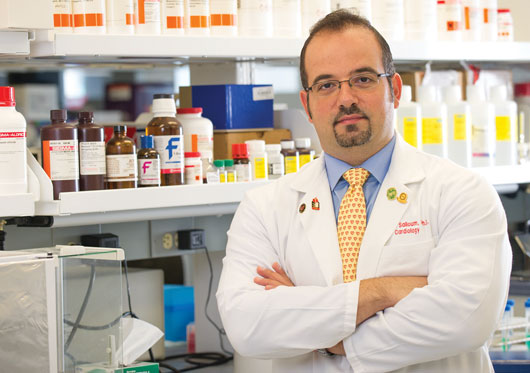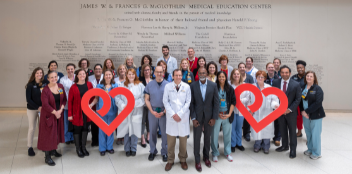Heart Failure Research Moves to Next Level
In the slow, highly regulated world of cardiac research, Fadi Salloum, PhD is on the fast track.

The VCU Health Pauley Heart Center scientist, who this spring received the VCU Distinguished Research Award in the Department of Internal Medicine and also served on the American Heart Association’s new Strategically Focused Research Network (SFRN) peer-review panel on heart failure, was recently awarded a $1.9 million “RO1” grant from the National Institutes of Health. The funds support a study that “will explore the exact mechanisms by which hydrogen sulfide (H2S) protects the heart,” he says. The study was ranked in the top 6% of all proposals in the Cardiac Contractility, Hypertrophy, and Failure study section.
In earlier research, Salloum and his colleagues found that daily H2S therapy can stem the progression of heart failure that often follows an acute myocardial infarction by suppressing inflammation and cell death.
“I want to build upon that research and also study two novel proteins that we identified as potential key players in the cardioprotective and anti-inflammatory response,” says Salloum, associate professor of Medicine and Physiology & Biophysics.
The proteins are Cofilin-2 and mitochondrial antiviral signaling (MAVS). Salloum’s research using an animal model of ischemic heart failure had previously discovered that, following a heart attack, the levels of Cofilin-2 increase while MAVS decreases. That’s bad news, since, at normal levels, MAVS is a beneficial protein that prevents programmed cell death pathways that are activated following ischemia. Also, Cofilin-2 tends to aggregate in heart muscle cells after stressful stimuli, and when expression is increased, it impairs the ability of the heart to function normally.
“I want to build upon that research and also study two novel proteins that we identified as potential key players in the cardioprotective and anti-inflammatory response,” says Salloum.
In the RO1 study, which began in July, he and co-investigators Anindita Das, PhD, Edward Lesnefsky, MD, Antonio Abbate, MD, PhD., Qun Chen, PhD and Stefano Toldo, PhD will further explore H2S and its effects upon Cofilin-2 and MAVS, and take a closer look at the proteins themselves.
The previous H2S trials began with animal heart failure models. Salloum later verified the results with trials using human heart failure samples—that is, tissue from failing human hearts at the time of transplantation. “Now that we have validated that this protein [Cofilin-2] is important clinically, we’re back to animal models in this grant. And I will test how we can manipulate this protein through different approaches, including gene therapy, and see if that will alleviate heart failure.”
He hopes the findings will lead to clinical trials in the near future, ultimately leading to drug or gene therapies for patients with heart failure.
He is also undertaking two other studies on Serelaxin, a promising drug for acute heart failure patients by Novartis Pharmaceuticals. One study is supported by ~ $400,000 industry grant that is set to begin this summer, and the other to study relaxin receptor by a $420,000 NIH exploratory R21 research grant—ranked in the top 3%—that starts September 1. (See sidebar for more information on the differences between the grants.)
Serelaxin is a synthetic form of the hormone relaxin, which is present in small amounts in both men and women but increases significantly during pregnancy. It is associated with improved heart, blood vessel ,and kidney function. The FDA had designated Serelaxin one of its new “Breakthrough Therapy” drugs for heart failure to hasten its approval. But the agency denied the drug in 2014, requesting further data. A Stage III clinical trial involving 6,300 patients is expected to be completed this year.
Salloum’s studies of the drug will include both animal models of heart failure and human heart failure samples that will provide additional data to further understand the mechanism of action of Serelaxin. Having researched Serelaxin previously, he says, “We saw fascinating results with this drug as far as attenuating acute heart attack injury and also we observed survival and heart function benefits in long-term studies.”
With his research and his accolades, “Fadi has proven he is a big player in the world of basic science,” says Kenneth Ellenbogen, MD, chair of the Division of Cardiology.
Back to Summer-2016
Join our Pauley Consortium composed of patients, friends and advocates.

